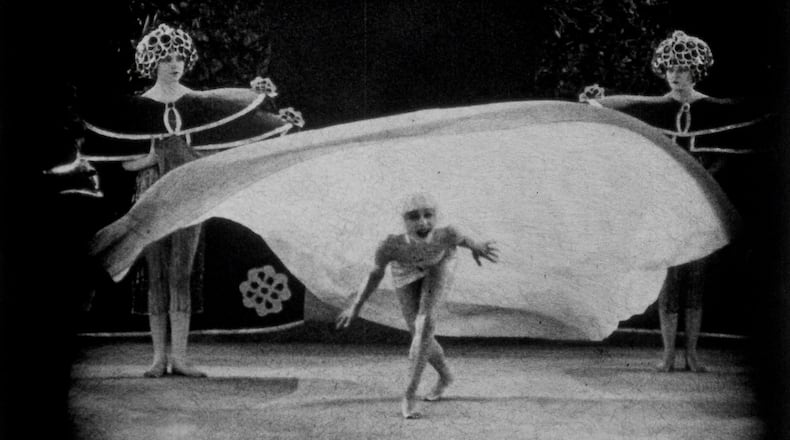It has been in the works for two years, but the timing couldn’t have been better for the upcoming release of “Pioneers: First Women Filmmakers,” a box collection of silent films made by women. In a year when gender equity and the #metoo movement were constants in the news cycle, a 28-hour reminder that women once played an integral role in the film industry seems like a fitting end to 2018.
The project was helmed by Atlantan Bret Wood, vice president and producer of archival restorations for Kino Lorber, which produced the collection in collaboration with the Library of Congress. But he didn't work alone. He tapped Shelley Stamp, a film professor at the University of California-Santa Cruz and an expert in early films by women, to curate the collection.
Stamp provided Wood with a wish list of films, and he obtained what he could from the archives. He also secured financing, supervised restoration, commissioned new scores, made short documentaries to accompany the collection, and designed the packaging. Stamp had the task of screening all the films and selecting which ones would make the cut.
The volume of films from which they had to choose came as a surprise to both Wood and Stamp.
“We initially were planning for five discs, but we had so much material that Kino Lorber gave the go-ahead to do a sixth disc,” said Stamp. “And there’s more on Blu-ray. Even still, we had to leave out stuff.”
They also were astonished by the variety of the films.
“The biggest surprise was the diversity of films being made by women and the fact that they were not necessarily women’s pictures,” said Wood. “It’s not like women directors were hired to make films for women. Women were hired because they had been screenwriters. They were actors. They knew how to make movies. They made dramas. They made comedies. They made westerns, adventure serials …”
It’s estimated that during the first decade of the 20th century, 15 percent of directors and 40 percent of screenwriters were women. But that changed in the 1920s when filmmaking became a profitable industry and studios began consolidating by buying up smaller studios and putting them out of business.
“In order to finance theater chains, Hollywood studios borrowed money from Wall Street and bought into a kind of corporate culture, which is male-oriented,” said Stamp. “It became really hard to work outside the studio system. So the industry forgot about women. By the late ’20s, there were very few women filmmakers.”
With few exceptions, such as Dorothy Arzner in the ’30s and ’40s, and Ida Lupino in the ’50s, directors were male across the industry. It wasn’t until the ’70s that women began to make inroads.
And in a peculiar twist of collective amnesia, women’s contributions often were omitted from many histories of the silent film era.
Wood hopes this collection will help restore a piece of forgotten film history and serve as a reminder that women can and should be making all kinds of films, because they already did it a century ago.
The collection contains shorts, features and fragments of films by more than a dozen filmmakers, including Lois Weber and Alice Guy Blaché, who were among the most prolific, and Marion E. Wong, the first Chinese-American director whose film, “The Curse of Quon Gwon,” features the first entirely Chinese-American cast. Also included are 12.5 minutes of ethnographic films from Zora Neale Hurston, who captured everyday African-American life in 1929 Florida.
Both Wood and Stamp cited “Salome,” a 71-minute feature made by Alla Nazimova in 1923, as a favorite among the collection.
“It’s just so extreme and unconventional,” said Wood. “It really wanted to be this extravagant art film with overt gay iconography. It was a fairly big-budget film and it pretty well sunk the career of the filmmaker. Also, the restoration looks good and it has a great film score.”
Wood also is fond of a film by Lois Weber.
“‘Suspense’ is this amazing, 10-minute thriller, which is great because it’s so tightly made,” he said. “This was made when D.W. Griffith was considered the pioneer of storytelling, and it is just as compelling, but with a lot more innovative camera work. There’s a scene that’s shot through a rearview mirror of a speeding car. There’s a split screen. It’s crazy how much is packed into such a short film.”
While the films in the collection vary wildly in genre, there is one thing they have in common.
“Women filmmakers center on female experience,” said Stamp. “Most of these films feature a female protagonist. … It’s extraordinary to see how few female protagonists there are in film today, how little speaking time and how little screen time women still get. What we’re missing is film with female protagonists. It’s a simple thing, but it’s really important. We’re half the population.”
Selections from “Pioneers: First Women Filmmakers” will air on TCM all night long, starting at 8 p.m. on Nov. 1 and Nov. 8. And the entire collection, available on DVD and Blu-ray, goes on sale Nov. 20.
It is the second release in Kino Lorber's Pioneer series. The first was "Pioneers of African American Cinema," a five-disc set that won the National Society of Film Critics' Film Heritage Award in 2016.
Another Pioneer collection is not in the works just yet, but 2019 will see Kino Lorber release collections of Yiddish films and exploitation films from the ’30s and ’40s, as well as a number of individual films, including “The Queen,” a 1968 documentary about a drag competition in New York.
Aside from his work with Kino Lorber, Wood is also an independent filmmaker with a bent for horror. His latest feature, “Those Who Deserve to Die,” is a revenge thriller with a supernatural twist that is currently in post-production.
But Wood has increasingly become interested in producing podcasts. His first podcast was “The Control Group,” a 30-minute serial thriller set in a 1960s-era mental hospital that was so successful, Atlanta-based production company How Stuff Works ordered up a second season. He’s also working on a new serial called “The Seventh Daughter,” which comes out in early 2019.
For the foreseeable future, Wood said he plans to focus his creative energies more on podcasts than film.
“It’s so less stressful,” he said. “And I don’t have to mortgage my house again.”
TV PREVIEW
'Pioneers: First Women Filmmakers.' Selections air on TCM starting at 8 p.m. on Nov. 1 and Nov. 8. DVD and Blu-ray available for purchase Nov. 20. www.kinolorber.com
About the Author
Keep Reading
The Latest
Featured





